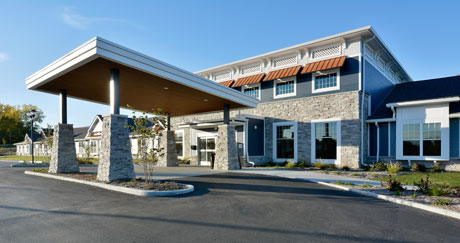Former Kansas governor transitioned 11 years ago from politician to leading one of the largest healthcare associations in the industry, and he’s never looked back. By Jeff Shaw Mark Parkinson’s wide-ranging career in both the private and public sectors, including a stint as an owner and operator of long-term care facilities in Kansas and Missouri, makes him uniquely qualified for his current role. After earning a law degree and starting his own firm, Parkinson entered politics in his home state of Kansas, serving in the State House from 1991 to …
Legal Issues
Consider offshoring some staff By Sarah Thomas CEO MezTal With inflation and staff shortages impacting us all, it’s difficult to find qualified talent to fill our open positions at a rate we can afford to sustain. The average salary increase in the U.S. this year for people who switched jobs was 12.2 percent. This means open positions are not only hard to fill but come with a much bigger salary expectation. Looking at offshoring or near-shoring options is a reality many have sought since inflation is high. Seek optimization By …
Ventas Appoints Michael Embler to Board of Directors, Passes on Nominations from Activist Shareholder
CHICAGO — Ventas Inc. (NYSE: VTR) has appointed Michael Embler, former chief investment officer of Franklin Mutual Advisors, to its board of directors. Jay Gellert, who has served on the Ventas board since 2001, will retire from the board at the company’s annual meeting in May. Embler will serve on Ventas’ investment and audit committees. Ventas also announced that Melody Barnes is expected to serve as chair of the Nominating & Corporate Governance Committee, effective at the company’s annual meeting. Embler, 57, is an institutional investor with 30 years of …
MURFREESBORO, Tenn. — National Health Investors Inc. (NYSE: NHI) has entered into a memorandum of understanding with Welltower (NYSE: WELL) regarding a lawsuit over a portfolio of Holiday Retirement properties. The agreement sets forth principal terms by which NHI and Welltower agree to operate until the execution of a final settlement agreement resolves the litigation. The agreement states that both REITs wish to transition the 16 communities to new tenants. The two companies will cooperate to sell one of the communities. Meanwhile, Welltower will pay NHI $6.9 million, which will …
IRVINE, Calif. — Sabra Health Care REIT Inc. (NASDAQ: SBRA) has entered into a definitive agreement to amend the company’s master lease with a tenant, Avamere Group. Avamere’s annual base rent on the current portfolio has been reduced roughly 30 percent to $30.7 million from $44.1 million. No changes have been made to the lease maturity date (May 31, 2031) or the annual base rent escalator (2.75 percent). Sabra plans to recapture this rent reduction as the portfolio’s performance improves. Starting with the second lease year, Sabra will participate in …
A variety of partnerships and lease structures present many options for landlords and tenants to both benefit. By Jeff Shaw In the retail real estate world, triple-net leases are king. Under this standard agreement, the tenant is responsible for all expenses — taxes, insurance, maintenance, utilities and rent to the owner. But seniors housing is a very different type of real estate. In retail, if a tenant fails, the owner simply finds a new one. For senior living, there’s a human element at play both for the employees and the …
By Phillip Joseph and Gabriel Coelho, Ball Janik Tragedies often guide reform and progress. After the Champlain South Tower condominium in Surfside, Florida, collapsed, attention has focused on preventing similar future tragedies. There is a renewed focus on ongoing oversight, construction and inspection of residential towers throughout Florida, especially for vulnerable members of society. Recertification requirements Let’s begin with a brief introduction to the recertification requirements discussed in the aftermath of the Champlain South collapse. Surprisingly, recertification is not a state requirement, but a Miami-Dade County creation enacted in 1974. …
Webinar: COVID Strategies for Seniors Housing Operators — Managing Risk
In the Oct. 26 Seniors Housing Business webinar entitled “COVID Strategies for Seniors Housing Operators — Managing Risk for Residents, Staff and Service Providers,” the topic of discussion was how best to keep residents and staff safe from COVID-19. Panelists shared differing approaches to this difficult problem, as well as their decision-making processes for setting vaccination requirements within their communities, employee incentives, communication strategies and how to implement these best practices in the midst of staffing shortages. Listen to hear how these decisions impact seniors housing operations, human resources and marketing approaches, …
How to use these factors to reduce a senior living property’s tax assessment. By Morris Ellison The longstanding debate over intangible value in commercial real estate taxation rages unabated, and nowhere is the squabbling fiercer than in valuing senior living facilities. Because these properties generally transact based on income from a going concern rather than from real estate, taxpayers planning to acquire a seniors housing facility should consider how to separate intangible value prior to acquisition. Simply waiting for the annual tax bill is a recipe for incurring inflated cost …
State-by-state comparisons do little to solve the correct future for this complicated issue. By James Tellatin, Integra Realty Resources It is not surprising that states with certificate of need (CON) laws for skilled nursing facilities (SNFs) have higher occupancy than states without CON requirements, or moratoriums on new beds. Occupancy States Without Certificate of Need (8) 74.7% States With Certificate of Need 80.7% States With Skilled Nursing Facility Moratorium and No CON (9) 82.4% Source: 2019 Certification and Survey Provider Enhanced Reports (CASPER) The central question surrounding certificate of need …





